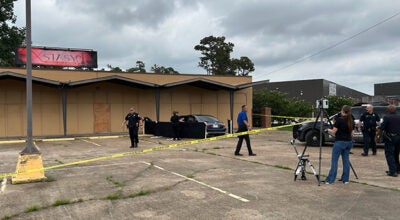A friendly reception: City promises to find ways to protect Mardi Gras financial base
Published 10:10 pm Tuesday, July 31, 2018
Mardi Gras Southeast Texas got a sympathetic reception from the Port Arthur City Council on Tuesday, with promises that the council would consider ways — possibly an event zone, or buffer — to protect the financial base of the non-profit organization.
Tim Romero, MGST chairman, and Laura Childress, president, said Mardi Gras 2018 marked the first time the Port Arthur group lost money — more than $100,000 — in a carnival season. They tied the losses primarily to heavy rain during the festival, which was held on Thursday through Sunday before Fat Tuesday.
“Mardi Gras needed to be held in 2018,” Romero said, to bolster the community, which was still suffering the ill effects of Hurricane and Tropical Storm Harvey.
But Romero and Childress also said the financial strength of the festival, which includes parades and celebrations within a gated area, has suffered from declining ticket sales and attendance and eroding profits because of vendors who set up outside the festival gates, siphoning off business that used to be transacted inside the gates.
Romero reminded the council at its Tuesday meeting that his organization pays $100,000 in preparation before the gates ever open for Mardi Gras, and that it pays $65,000 for city services, including police protection. Because of its investment in the downtown and in the festivities, he said, Mardi Gras remains safe and fun in Port Arthur.
Romero and Children said vendors who remain outside the gates pay a nominal city fee to do business but nothing to the Mardi Gras organization, giving them an advantage over vendors inside, who pay substantial fees for services. Inside the gates, they said, vendors check for IDs for alcohol sales, food is safe and patrons “celebrate in complete safety.” Outside the gates, they said, “It’s buyer beware.”
Because of the increased competition outside the gates, they said, festival vendors are losing profits and some are leaving. Some have even moved outside the gates to do business more cheaply, undercutting the financial stability of the event.
Romero and Childress suggested an exclusion zone, a buffer of at least several city blocks between the gated Mardi Gras celebration and independent vendors.
District 4 Councilman Harold Doucet seemed to favor a buffer zone, noting that other cities apply event zones to protect special events. He said health and safety of Mardi Gras patrons is paramount in importance.
Mayor Pro Tem Thomas Kinlaw cautioned the city must make changes with the advice of legal counsel, noting it might be illegal to bar people from selling products from their own property. For example, he said, Lamar State College Port Arthur is among those who sell items during Mardi Gras.
Mayor Derrick Freeman said for some downtown land owners, the only time their property holds special value is during Mardi Gras.
But council members suggested that they would review the issue and try to help sustain the Mardi Gras organization.
Childress said after the meeting that she thinks the City Council has a better understanding of the organization’s needs and that they “understand our position.”
She said Mardi Gras Southeast Texas is committed to operating in 2019 and hopes to have a resolution to their problems “before event time.”





